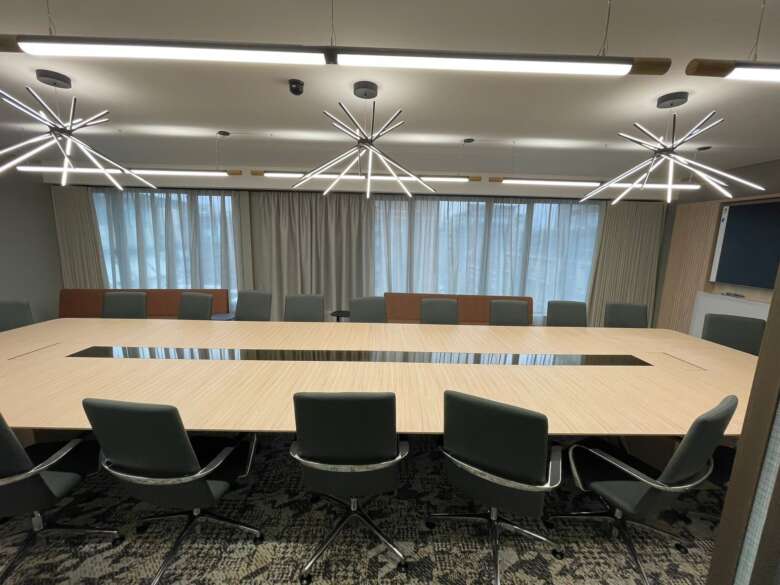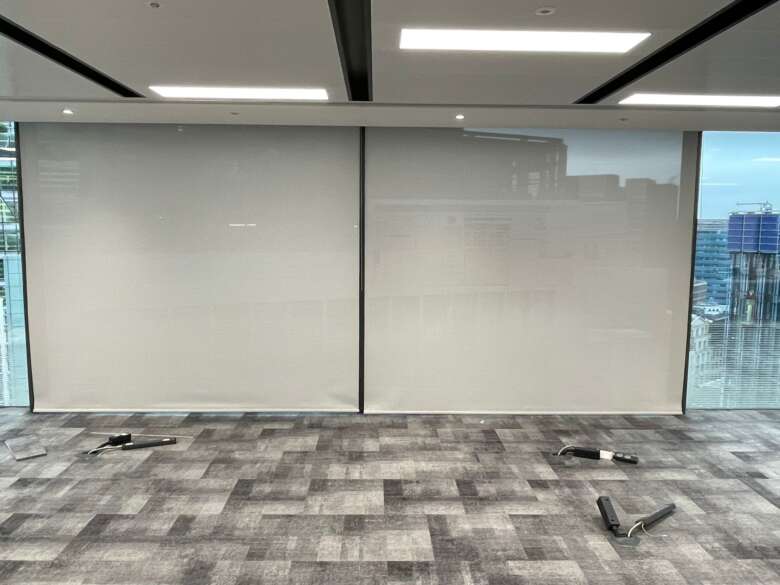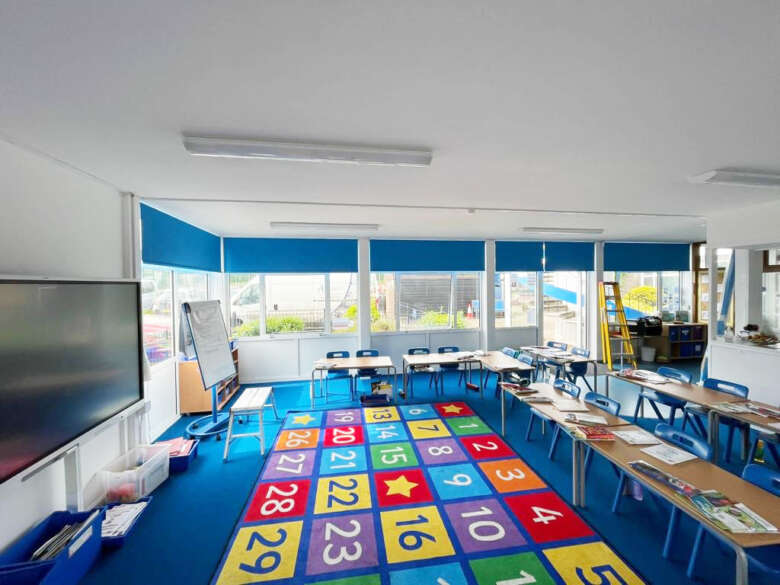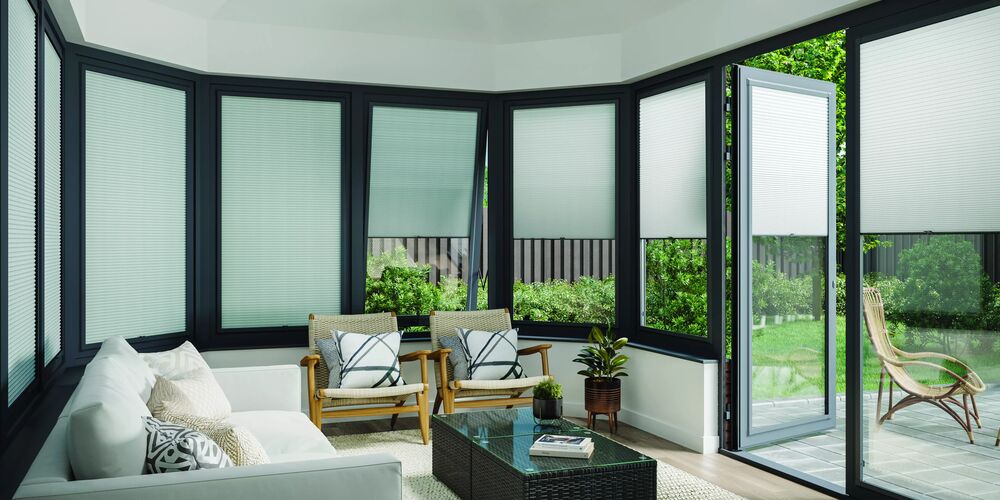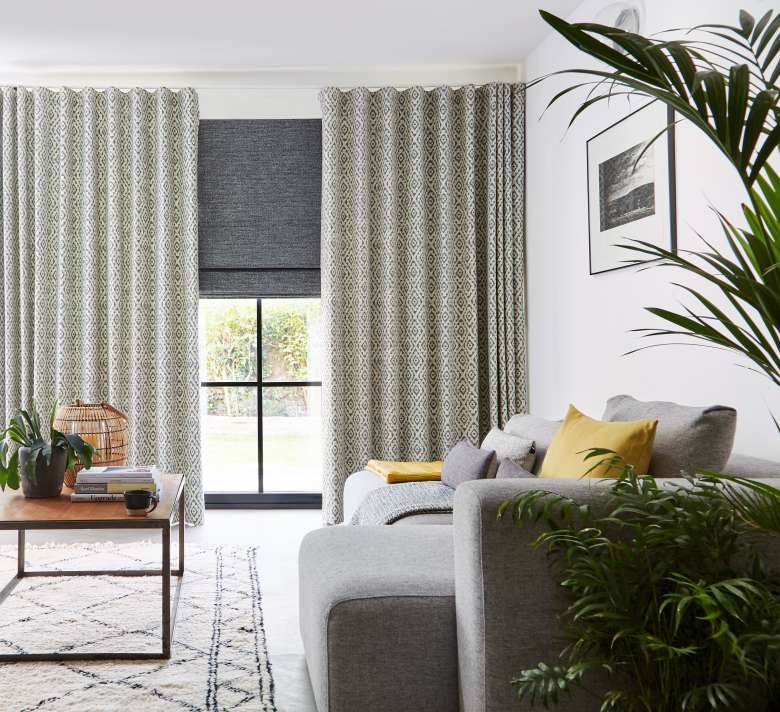
Absolute Journal
Your Guide to Different Types of Curtains
We provide a comprehensive overview of curtain headers, pleat styles, fabric options, light filtration levels, and various curtain styles, helping you navigate the overwhelming choices to make informed decisions about the perfect curtains for every window in your home.
Have you ever stood before a window in your home, trying to figure out what curtains would look best? With seemingly endless headers and pleat styles, fabrics and light filtration options, you may feel overwhelmed. Don’t worry - this guide has everything you need to help you decide which curtains to hang in every window.
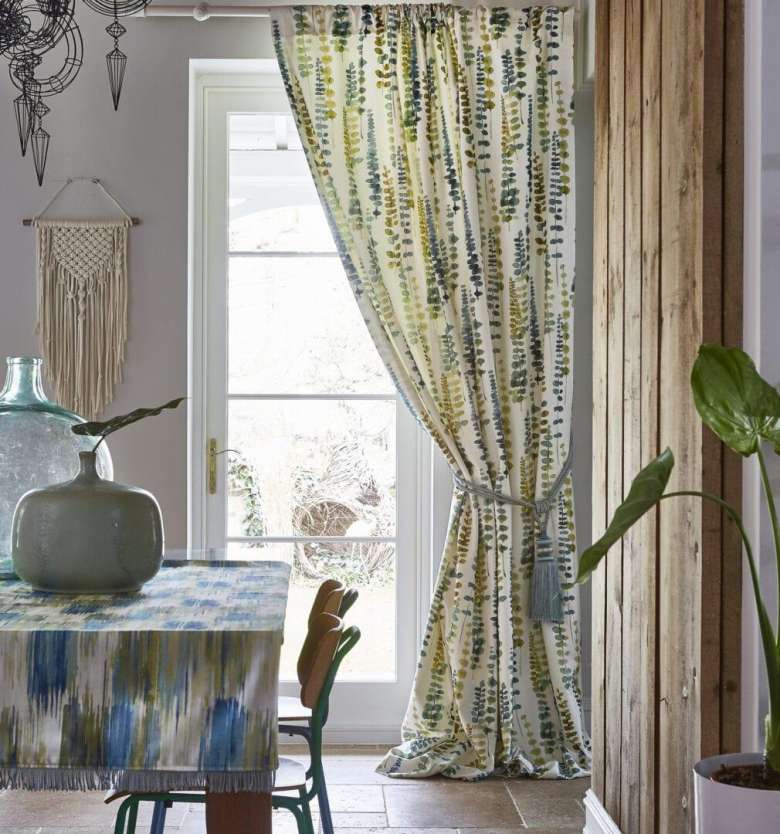
What are the Types of Curtain Headers and Pleat Styles?
If you look closely at the top of any curtain, you’ll notice one type of header or another. Some curtains are pinched at the top, whilst others thread through the rod itself. The header not only affects how the curtain hangs but creates different types of pleats, determining the window covering’s fullness, shape and volume. Here’s a brief look at the different curtain headers and pleats available:
- Rod pocket: A simple and traditional style, rod pocket curtains have a pocket sewn into the top, through which the curtain rod slides, creating a gathered look when the curtain opens.
- Grommet or eyelet header: These headers have metal rings embedded into the fabric, providing a sleek, modern look and smooth movement along the curtain rod.
- Goblet header: This style features rings evenly spaced along the top of the curtain that allow the rod to pass through. Then, the fabric is pinched together a few inches below the rings, creating little goblet-shaped pleats along the top of the curtain.
- Knotted or tie top: Ideal for a beachy or casual feel, knotted or tie top curtains feature fabric ties along the top, which loop around the curtain rod.
- Tab top: Tab top curtains create a relaxed and informal appearance, with fabric loops sewn along the top edge.
- Back tab: Designed to conceal the curtain rod, back tab curtains have loops sewn on the reverse side of the fabric, creating a clean, streamlined look.
- Cubicle header: Often found in hospitals and offices, these curtains pair with a unique track system that ensures smooth movement and easy operation.
- Wave header: Offering an elegant and fluid appearance, wave headers fit a slim, discreet track that can be installed above any window. When pulled open, the curtain adopts a soft, continuous wave, making this the perfect window covering for modern interiors.
- Ripple fold: Known for their neat, uniform folds, ripple fold curtains add a modern yet classic aesthetic to the room.
- Tailored pleat: Sophisticated and timeless, tailored pleat curtains have evenly spaced single pleats that fall straight, making them suitable for both traditional and contemporary settings.
- Pinch pleat: A classic and elegant style, pinch pleat curtains feature groups of pleats pinched together at the top, creating a decorative fan effect along the top.
- Pencil pleat: With tightly gathered pleats resembling a row of pencils, pencil pleat curtains offer a versatile and adaptable style for various interiors.
- Inverted pleat: Inverted pleat curtains have hidden pleats that fold inwards, resulting in clean, flat panels and a neat, tailored appearance.
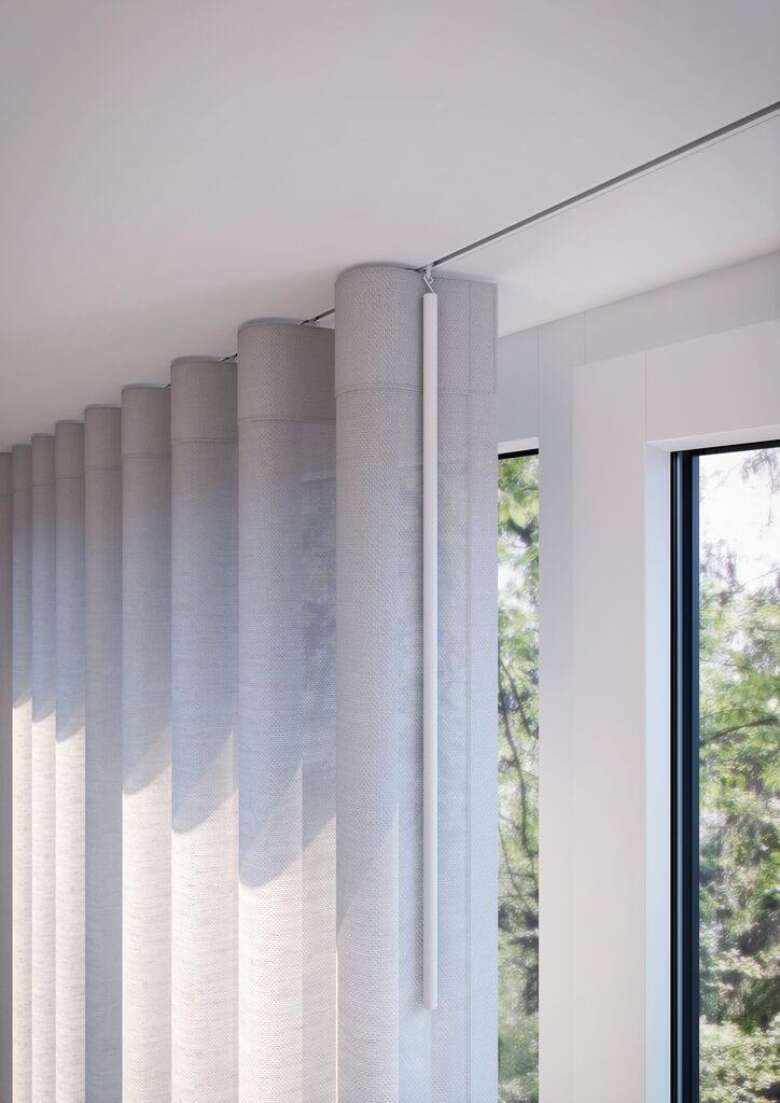
What are the Different Kinds of Fabric Curtains?
The fabric you choose for your curtains greatly impacts their overall look and feel. Of course, every material also comes in countless colours and patterns. Explore some of the most popular curtain fabrics available:
- Cotton: Versatile, durable and easy to clean, cotton curtains provide a crisp, tidy look suitable for a range of interiors.
- Silk: When you want a luxurious and elegant window covering, consider silk curtains. This material drapes beautifully and adds a touch of sophistication to formal spaces.
- Linen: For a more casual feel, consider lightweight and breathable linen curtains. You’ll enjoy a relaxed aesthetic and allow soft, diffused light to enter the room.
- Polyester: Known for its affordability and low maintenance requirements, polyester is a practical choice that suits various design styles.
- Velvet: Thick velvet curtains offer excellent insulation and light-blocking properties. This material exudes opulence, making it perfect for formal studies and sitting rooms.
- Acrylic: Acrylic curtains mimic the appearance of natural fibres like wool and cotton whilst offering improved resistance to fading and moisture.
- Rayon: Soft, versatile rayon curtains drape well and come in various textures, patterns and colours.
- Brocade: Characterised by its intricate, raised patterns, brocade curtains add elegance and sophistication to any room.
- Lace: Delicate and feminine, lace curtains allow light to filter through whilst blocking the line of sight, making them an excellent choice for private living rooms and bedrooms.
- Voile: Voile curtains create a soft, ethereal look thanks to their sheer, lightweight characteristics. They allow natural light to filter through even as they obscure the view.
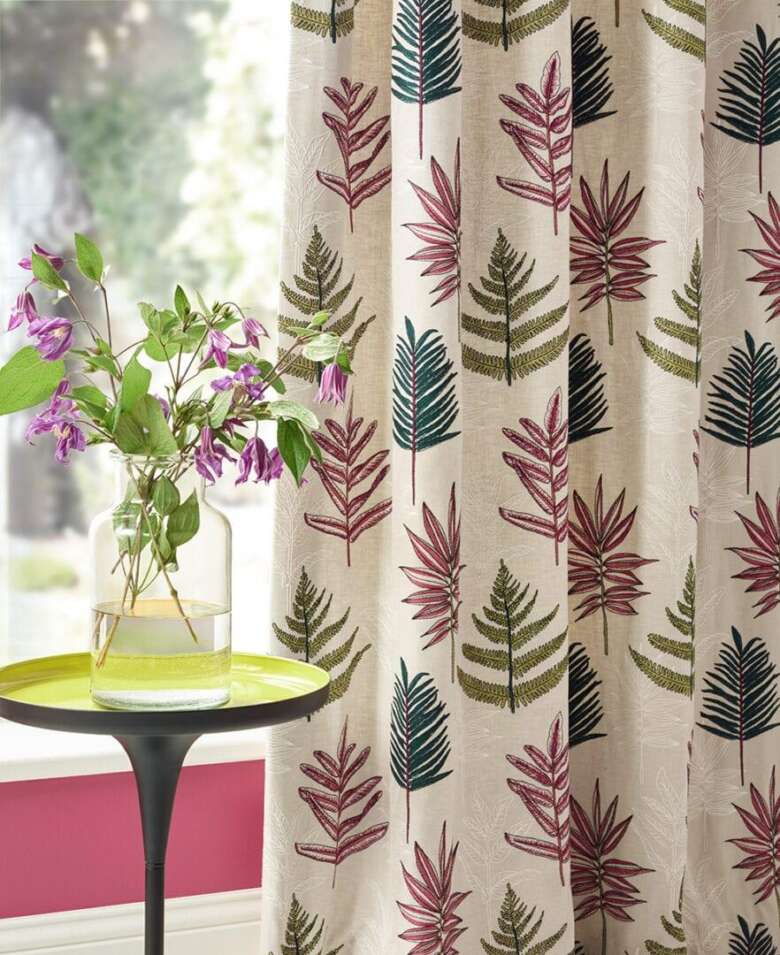
What are the Different Light Filtration Levels?
Curtain materials don’t just affect how the fabric hangs—they also determine how much light enters when closed over a window. Here’s an overview of the various light filtration levels curtains may provide to help you create the desired ambience:
- Sheer: These curtains, made of lightweight materials like lace or voile, diffuse the light that enters whilst providing a degree of privacy.
- Semi-sheer: Offering more privacy than sheer curtains, semi-sheer materials still allow a considerable amount of light to enter.
- Light filtering: The next degree of light filtration strikes a balance between privacy and natural lighting, making light-filtering curtains a popular choice for living rooms and kitchens.
- Room darkening: As the name suggests, these curtains block out a significant amount of light, creating a more subdued atmosphere perfect for bedrooms and media rooms.
- Blackout: Popular for bedrooms, nurseries and home cinemas, blackout curtains effectively block out nearly all natural light, ensuring a dark and restful environment.
- Light reflecting: With a white backing designed to reflect sunlight, these curtains help maintain a cooler interior during hot summer months.
- Thermal: Thermal curtains feature an insulating layer to help retain heat in the winter, keep rooms cool in the summer and reduce noise transfer from outside.
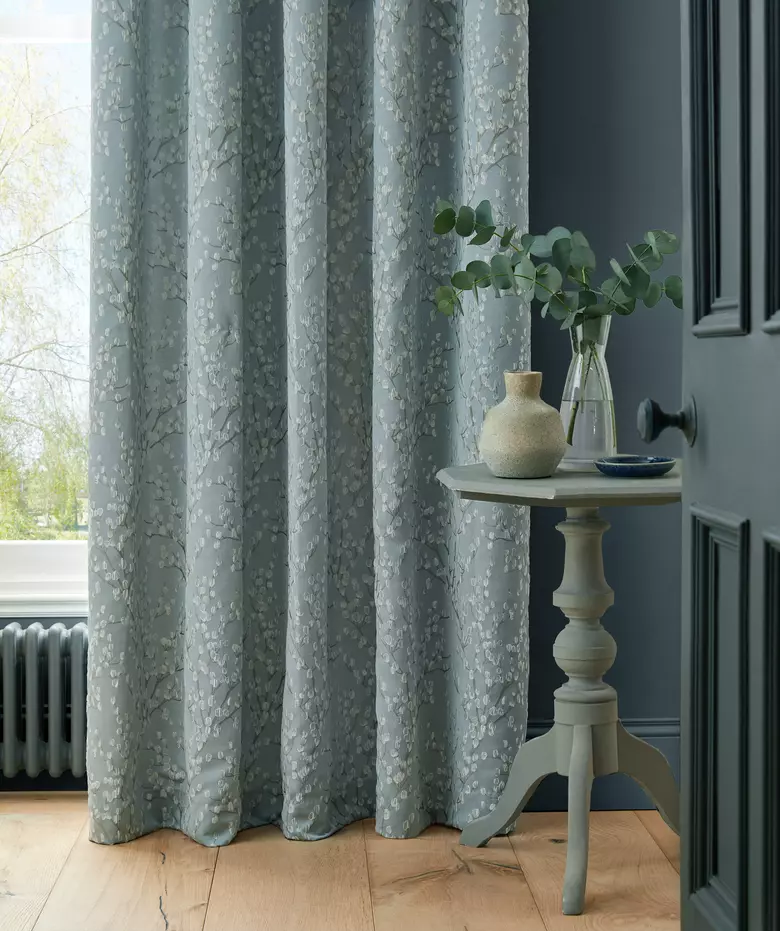
What are Some Different Curtain Styles and Features?
Curtains come with numerous lengths, placements and styles, with features designed to suit different preferences and window types. Consider what options you might want when selecting your window coverings:
- Window scarves: A decorative accessory, window scarves drape elegantly across the top of a window, adding a touch of sophistication.
- Curtains with pelmets: Pelmets are decorative coverings that conceal curtain rods and tracks, providing a polished and refined appearance in stately homes and historic buildings.
- Valances: This decorative top treatment is another way to add visual interest. Valances can be used alone or paired with curtains or blinds.
- Cafe curtains: By covering only the lower portion of a window, cafe curtains offer privacy whilst still allowing natural light to enter.
- Curtains with tiebacks: Tiebacks are fabric bands or cords used to hold curtains back, creating a neat and elegant look.
- Single-panel curtains: This style is ideal for smaller windows or when simplicity is preferred.
- Double-panel curtains: This classic configuration features two panels that can be drawn open or closed, providing flexibility in terms of light and privacy.
- Windowsill curtains: Designed to just touch the windowsill, these curtains create a tailored and uncluttered appearance.
- Apron curtains: Falling slightly below the windowsill, apron curtains provide a casual and cosy look.
- Floor-length curtains: Extending from the curtain rod to the floor, these window coverings afford an elegant, classic aesthetic.
- Motorised or electric curtains: Made for convenience and ease of use, motorised or electric curtains can be opened and closed with the touch of a button.
- Ready-made curtains: These window coverings are available in standard sizes and designs, a convenient and cost-effective option for those seeking a simple window treatment solution.
- Made-to-measure curtains: For a tailored fit and customisable design options, consider made-to-measure curtains. These window coverings allow for greater personalisation to suit individual preferences and unique window sizes.
What Curtains Should I Get?
At Absolute Blinds, we understand that choosing the right curtains can be overwhelming, but our expertise and personalised service make this process a breeze. As a small, family-run business with over 15 years of experience, we take pride in offering tailored solutions to our Hertfordshire customers. Our team genuinely care about your satisfaction and strive to help you find the perfect curtains for every window.
Ready to elevate your living space with made-to-measure curtains? Contact us on 01707 244855 to discuss your needs and schedule an appointment with our showroom. We look forward to transforming your windows and enhancing the beauty of your home!
